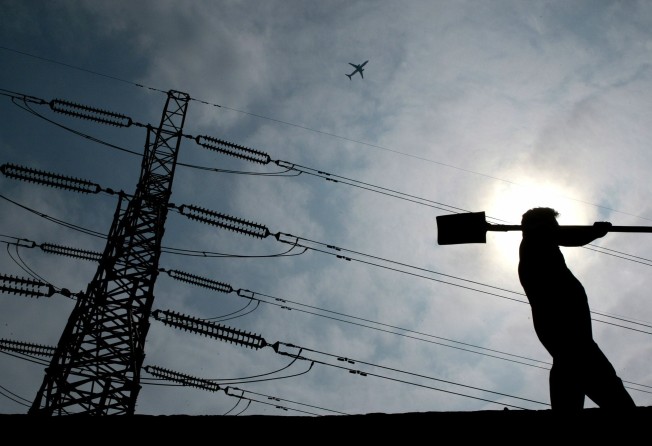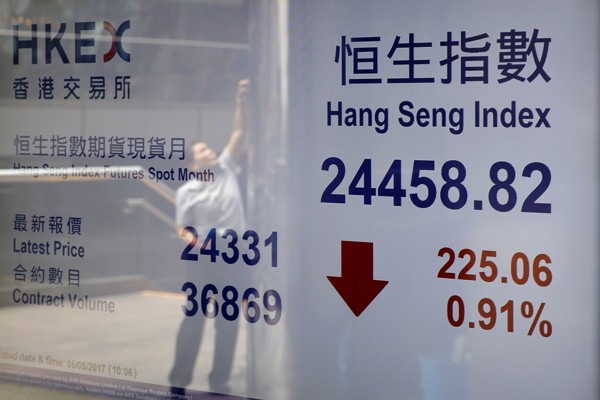
Cathay Pacific leads gains in Hong Kong; mainland China stocks fluctuate

Hong Kong’s loss-making flagship carrier Cathay Pacific Airways saw its biggest daily gain in 14 months on Wednesday after chairman John Slosar said the airline is making “significant progress” on the restructuring that began early this year.
Cathay, the best performer among the 50 components of the city’s benchmark Hang Seng Index, rallied 4.9 per cent to close at HK$11.10, its biggest daily gain since March 9 last year and the highest level in two months.
Data showed the number of passengers carried by Cathay Pacific and Cathay Dragon grew 3.2 per cent last month year on year to just over three million.
The carrier lost 1.9 per cent to HK$10.58 on Tuesday after MSCI announced it would remove the stock from its Hong Kong benchmark from May 31.
Among other gainers on Wednesday, Apple parts supplier AAC Technologies Holdings closed 2.2 per cent higher at HK$ 91.55 following four consecutive days of losses after short seller Gotham City Research questioned the company’s profit margins.
Tencent Holdings, mainland China’s second largest internet giant, rose 0.4 per cent to HK$259.80 after the company beat estimates with a 58 per cent jump in net income for the first quarter to a record 14.5 billion yuan (US$2.1 billion). Revenue climbed 55 per cent to 49.6 billion yuan.
Meitu, which offers a beauty-enhancing selfie app, dropped 9.1 per cent, its biggest decline since March 27, after MSCI reversed course and decided not to include the stock in its global indices. It ended the day at a two-month low of HK$9.80.
The Hong Kong market remained weak as a whole, with the benchmark falling for a second day after five days of gains.
The HSI dropped 0.2 per cent to 25,293.63 points while the Hang Seng China Enterprises Index eased 0.5 per cent to 10,383.14 points.
Financial stocks were the biggest drag on the market. HSBC Holdings was down 0.4 per cent to HK$68.70 while Bank of East Asia retreated 1.4 per cent to HK$32.45 and Hang Seng Bank shed 0.9 per cent to close at HK$162.60.
Insurance companies declined in both Hong Kong and Shanghai after the regulator took additional measures to rein in the sector.
China Life Insurance fell 2.8 per cent to 26.30 yuan in Shanghai and declined 1.4 per cent to HK$24.55 in Hong Kong while China Pacific Insurance retreated 2.1 per cent to 28.08 yuan in Shanghai and dropped 1.2 per cent to HK$29 in Hong Kong.
The China Insurance Regulatory Commission has banned life insurers from selling universal life products as an add-on to regular life policies in its latest move to clean up the industry amid the top policymakers’ drive to reduce leverage.
In mainland China, stocks ended a four-day winning streak amid volatile trade, with gains in utilities firms offset by declines in insurers.
The Shanghai Composite Index slipped 0.3 per cent to 3,104.44 points whereas the ChiNext index put on 0.4 per cent to 1,822.64 points, extending the 2 per cent jump on Tuesday.
Mainland stocks had had four consecutive days of gains through to Tuesday, recovering from a liquidity squeeze in the financial system that has sent the Shanghai index down 7.2 per cent over the past month.
After the shake-out in both the equity and bond markets, the central bank and the banking regulator signalled a softening in their scrutiny last week.
“The market has most probably seen its bottom already, and there isn’t much room for further declines now,” said Wang Zheng, chief investment officer at Jingxi Investment Management. “Investors are looking at value investing rather than speculation as the regulatory surveillance will remain heightened.”

A gauge tracking the mainland’s utilities companies was among the most active with a 0.4 per cent gain as investors rotated buying into the sector, which usually delivers stable dividends and earnings, after previously loading up on consumer companies such as liquor companies.
The sector also got a boost from a China Securities Journal report that the National Development and Reform Commission would soon remove the cap on gas prices for non-residential use.
Shanxi Guoxin Energy Corp surged by its 10 per cent daily limit to 10.81 yuan in Shanghai while PetroChina Jinhong Energy Investment added 2.6 per cent to 16.46 yuan.
Newly listed stocks Chongqing Qinan M&E, which manufactures car parts, and Jiangsu Seagull Cooling Tower both jumped by the 44 per cent limit on their first day of trading in Shanghai.
Separately, the People’s Bank of China and the Hong Kong Monetary Authority gave the nod to the much-expected bond connect scheme, which will be added to the current stock programmes linking the bourses on both sides of the border.
The link would initially start with northbound trading, which would allow international investors to trade in the China interbank bond market, the two authorities said in a statement, without giving a launch date.
